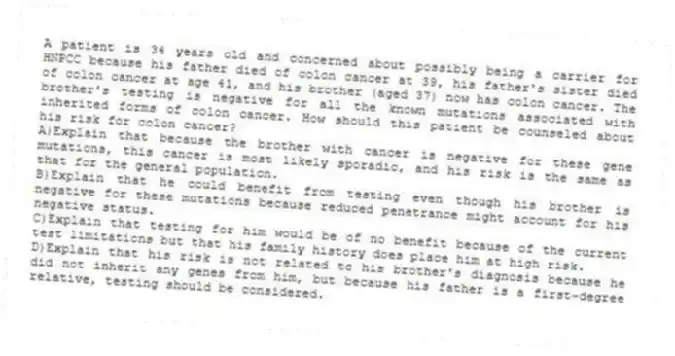
A patient is 34 years old and concerned about possibly being a carrier for HNPCC because his father died of colon cancer at 39, his father's sister died of colon cancer at age 41, and his brother (aged 37) now has colon cancer. The brother's testing is negative for all the known mutations associated with inherited forms of colon cancer. How should this patient be counseled about his risk for colon cancer?
A) Explain that because the brother with cancer is negative for these gene mutations, this cancer is most likely sporadic, and his risk is the same as that for the general population.
B) Explain that he could benefit from testing even though his brother is negative for these mutations because reduced penetrance might account for his negative status.
C) Explain that testing for him would be of no benefit because of the current test limitations but that his family history does place him at high risk.
D) Explain that his risk is not related to his brother's diagnosis because he did not inherit any genes from him, but because his father is a first-degree relative, testing should be considered.
Correct Answer:
Verified
Q1: What is the major disadvantage to the
Q2: Genetic testing that examines an asymptomatic person's
Q3: Which type of genetic testing is the
Q4: A woman whose sister tested positive for
Q5: When is fluorescence in situ hybridization (FISH)
Q7: Under which condition can preimplantation genetic testing
Q8: Which type of genetic testing examines a
Q9: How is the polymerase chain reaction (PCR)
Q10: Which tissue is most likely to provide
Q11: What type of genetic test provides information
Unlock this Answer For Free Now!
View this answer and more for free by performing one of the following actions

Scan the QR code to install the App and get 2 free unlocks

Unlock quizzes for free by uploading documents